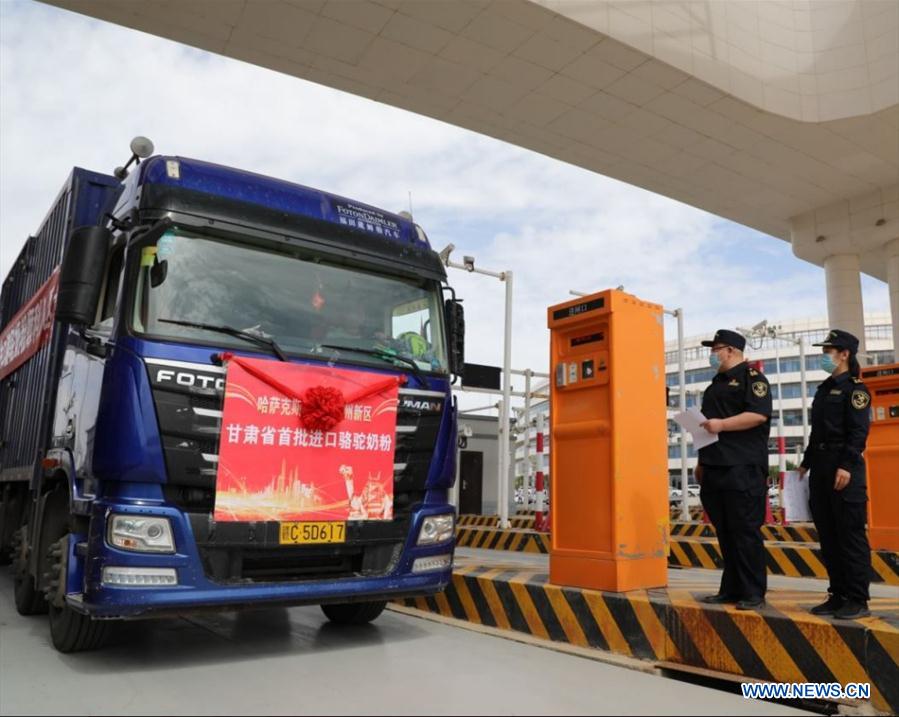
A truck loaded with camel milk powder from Kazakhstan arrives in Lanzhou, northwest China's Gansu Province, June 12, 2020. (Lanzhou New District Commercial Investment Group/Handout via Xinhua)
by Ren Jun, Wang Mingyu
NUR-SULTAN, June 27 (Xinhua) -- It's the most enchanting season on Kazakhstan's steppes where flocks of cattle, sheep, horses as well as shepherds on horseback wander under the clear blue sky.
Seven kilometers away from the village of Zhansary in central Kazakhstan's Karaganda Region, a dairy factory which produces camel and mare milk powder is in full swing of production.
"Recently our camel milk powder has successfully entered the Chinese market despite the pandemic, and horse milk powder is also expected to follow suit. Everyone in the factory gets motivated," said factory manager Bayan Elshin.
Every morning, Elshin, in his dark green jacket and riding boots, inspects the camel and horse sheds, checks the equipment imported from Germany and instructs workers on safety rules. Sometimes he drives to the nearby hills, watching over 2,000 horses in a pasture.
"Our factory is situated in an uninhabited area where more than 200 camels and 2,500 horses graze on the grassland of 35,000 hectares nearby. Camel milk and mare milk are treasures of the Kazakh people, we are glad that our products get recognition on the Chinese market," said Elshin.
The dairy factory was established by Kazakhstan's Eurasia Investment Co., Ltd. and was put into production in 2014, with an annual output of 60 tons of camel milk powder and 60 tons of mare milk powder.
Kairzhan Meirambekov, deputy general manager of Eurasia Investment, told Xinhua that last year the company opened a camel milk powder store at the China-Kazakhstan Horgos International Border Cooperation Center, with annual sales at 600 million tenge (about 1.5 million U.S. dollars).
"The success makes us feel the huge potential of the Chinese market and strengthens our determination to dive into the Chinese market," said Meirambekov, adding that, due to the coronavirus epidemic, the Kazakh side of the Horgos cooperation center has been closed since January, a big setback for the factory's sales goal.
On Jan. 29, China's General Administration of Customs issued an announcement allowing Kazakh camel dairy products to enter the Chinese market. Three Kazakh enterprises producing camel dairy products, including Eurasia Invest, are among the first batch of companies getting export licenses.
After months of arduous efforts, 7,000 cans of camel milk powder weighing 3.5 tons arrived at the comprehensive bonded area of the New District in Lanzhou, the capital city of northwestern China's Gansu Province, on June 12, and began online sales. Over the past two weeks, a total of 138 cans have been sold.
Meirambekov said that the milk powder production has not been affected by the pandemic because of its remote location. However, due to border restrictions and quarantine measures amid the state of emergency, the export of the first batch of products has been postponed from February to June.
According to Chinese importers, the import procedure takes months and is encountering many difficulties due to the pandemic. Staff had to switch to online mode to communicate with the Kazakh side and make up a logistics plan after consulting with the Kazakhstan Import and Export Association, the manufacturer's export agency, said Kang Kewei, manager of the Lanzhou New District Commercial Investment Group Comprehensive Bonded Zone International Trade Co., Ltd.
"Previously, Kazakhstan's camel milk powder entered the Chinese market only through border trade or overseas purchase. Now imported milk power is stored at a bonded warehouse. After customers place an order, products would clear customs and be delivered to doorsteps," said Kang.
Kang said consumers in Lanzhou can enjoy their camel milk powder within 24 hours after placing an order, while consumers from other regions can receive the products within a few days.
According to the statistics of Chinese customs, China imported 1.36 million tons of milk powder valued at 8.3 billion dollars in 2019, jumping by 20.8 percent in volume and 15.5 percent in value over the previous year.
In the first four months of 2020, China's imports of milk powder continued to increase, reaching 3.1 billion dollars, up 5.5 percent year on year.
Kang believed that as China's dairy consumption becomes more and more diversified, camel milk powder from Kazakhstan can provide Chinese consumers with more choices.
"For the dairy industry of Kazakhstan, the Chinese market offers a huge opportunity. Chinese consumers are getting to know camel milk powder, and the market size is developing. We have not yet obtained an export license for horse milk powder to the Chinese mainland. But the company is already actively promoting horse milk powder on the Chinese market," Merambekov said.
"At the end of this month, we will ship another three tons of camel milk powder to China. We are currently building a new milk powder factory in Almaty and buying new equipment to expand production capacity. We plan to increase the annual output of camel milk powder from 60 to 200-300 tons," said Elshin.



